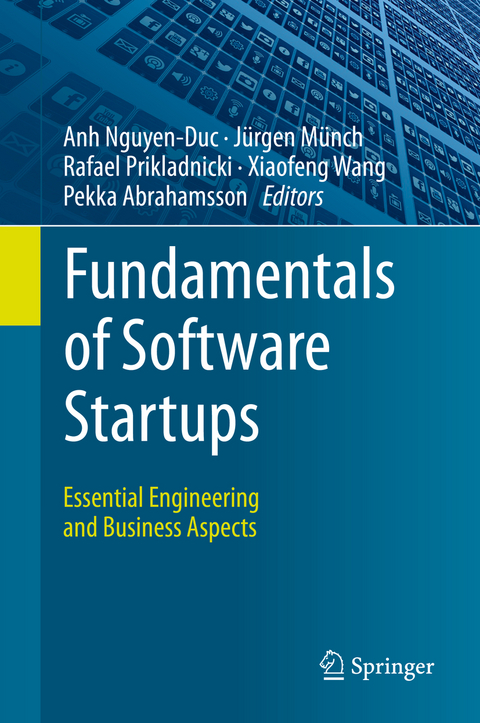
Fundamentals of Software Startups
Springer International Publishing (Verlag)
978-3-030-35982-9 (ISBN)
The book covers a wide range of software startup phenomena, and includes the knowledge, skills, and capabilities required for startup product development; team capacity and team roles; technical debt; minimal viable products; startup metrics; common pitfalls and patterns observed; as well as lessons learned from startups in Finland, Norway, Brazil, Russia and USA. All results are based on empirical findings, and the claims are backed by evidence and concrete observations, measurements and experiments from qualitative and quantitative research, as is common in empirical software engineering.
The book helps entrepreneurs and practitioners to become aware of various phenomena, challenges, and practices that occur in real-world startups, and provides insights based on sound research methodologies presented in a simple and easy-to-read manner. It also allows students in business and engineering programs to learn about the important engineering concepts and technical building blocks of a software startup. It is also suitable for researchers at different levels in areas such as software and systems engineering, or information systems who are studying advanced topics related to software business.
Anh Nguyen Duc is an Associate Professor at the University of South-Eastern Norway. He has authored/co-authored more than 50 publications in peer-reviewed journals, conferences, and workshops. His current research interests include software startup research, analytical software security, global software engineering, and empirical software engineering. Jürgen Münch is a Professor of Software Engineering, Entrepreneurship, and Innovation at Reutlingen University, Germany. His research interests include product management, product strategy, product design, startup methods, and measurement. He has been a principal investigator of numerous research and industrial development projects. He has been chairing several renowned scientific conferences such as the ACM/IEEE Symposium on Empirical Software Engineering and Measurement (ESEM). Rafael Prikladnicki is a Director of TECNOPUC (PUCRS' Science and Technology Park) since 2013 and professor at PUCRS since 2004. He is a professor of the Graduate Program in Computer Science at PUCRS since 2010. He also serves as chair of the advisory board of IEEE Software Magazine. He was one of the founders of Agile Alliance Brazil and a member of its board of directors from 2013 to 2017. His main areas of research are software engineering and entrepreneurship, global software engineering, agile methodologies, diversity in software engineering and empirical software engineering. Xiaofeng Wang is an Associate Professor at the Computer Science Faculty, Free University of Bozen-Bolzano, Italy. Her main research areas include software startups, agile and lean software development and innovation, continuous improvement of software processes, and human factors in software engineering. She is actively publishing in both software engineering and information systems venues, including Empirical Software Engineering, IEEE Software, Journal of Systems and Software, Information Systems Research, etc. Pekka Abrahamsson is a Full Professor of Information Systems and Software Engineering at the University of Jyväskylä, Finland. He is a pioneer in the field of agile software development research and has lead two large international research projects (AGILE-ITEA, FLEXI-ITEA2). His mobile-D(TM) development method is the most applied mobile application development method. His current research interests include empirical software engineering, ethics in artificial intelligence, software startups, and software robots. He holds an h-index of 44 and has delivered 20 keynotes in international conferences.
1. Six pillars of modern entrepreneurial theory and how to use them.- 2. Pivoting in Software Startups.- 3. Yes, we can! Building a capable initial team.- 4. The Perception and Management of Technical Debt in Software Startups.- 5. An analytical framework for planning a Minimum Viable Products.- 6. Software Startup ESSENCE - How Should Software Startups Work?.- 7. Startup Metrics that Tech Entrepreneurs need to know.- 8. Early-stage software startups: main challenges and possible answers.- 9. The Roles of Incubators, Accelerators, Co-working Spaces, Mentors, and Events in the Startup Development Process.- 10. Fostering open innovation in coworking spaces - A study of Norwegian startups.- 11. The maturity of startup ecosystems - The cases of New York, Tel Aviv and San Paolo.- 12. Thailand's Tech Startup Ecosystem.- 13. Software Startup Education - A Transition From Theory to Practice.- 14. Teaching "through" Entrepreneurship: an Experience Report.- 15. Lean Internal Startups: Challengesand Lessons Learned.- 16. Software Startup Education: Gamifying Growth Hacking.- 17. Key influencing factors in early-stage Norwegian hardware startups- A trilateral model of speed, resource and quality.- 18. The rise and fall of a database-as-a-service Latvian unicorn.- 19. Triggers of Business Success of IT Startup Owners in Russia.- 20. Brazilian startups and the current Software Engineering challenges - The Case of Tecnopuc.
| Erscheinungsdatum | 05.03.2020 |
|---|---|
| Zusatzinfo | XX, 345 p. 108 illus., 36 illus. in color. |
| Verlagsort | Cham |
| Sprache | englisch |
| Maße | 155 x 235 mm |
| Gewicht | 717 g |
| Themenwelt | Mathematik / Informatik ► Informatik |
| Wirtschaft ► Betriebswirtschaft / Management ► Wirtschaftsinformatik | |
| Schlagworte | Computing and business • computing profession • Innovation Management • Software Economics • Software engineering • Software Entrepreneurship • software startups |
| ISBN-10 | 3-030-35982-4 / 3030359824 |
| ISBN-13 | 978-3-030-35982-9 / 9783030359829 |
| Zustand | Neuware |
| Haben Sie eine Frage zum Produkt? |
aus dem Bereich


